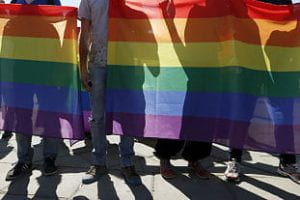By Mengia Tschalaer and Nina Held 
LGBTQI+ people seeking asylum in Germany often remain invisible and unrecognized within Germany’s asylum system unless they specifically come forward and out themselves. Our new report shows that better visibility and access to legal and social support is needed for this group of asylum seekers.
The German Lesbian and Gay Association (Lesben und Schwulen Verband Deutschland) estimates that out of the nearly 1.6 million refugees that have been registered in Germany between 2015 and 2018 approximately 60,000 are LGBTQI+ individuals from countries in the Middle East, Africa, South Asia and the Caribbean. While human rights violations based on sexual orientation and gender identity are grounds for seeking asylum in Europe a policy brief, published by University of Bristol, points out that LGBTQI+ people seeking asylum in Germany face unique challenges as compared to non-LGBTQI+ individuals when seeking refugee protection.
The data that led to the key findings of the policy report derives from our two EU-funded research projects entitled Queer Muslim Asylum in Germany and SOGICA – Sexual Orientation and Gender Identity Claims of Asylum. Nina Held is a sociologist who researches sexual orientation and gender identity asylum claims in Germany at the University of Sussex and Mengia Tschalaer is an anthropologist who examines the asylum experiences of LGBTQI+ individuals with Muslim background in Germany at the University of Bristol. Between 2017 and 2019, we conducted over 100 interviews with NGO professionals, lawyers, judges, policy-makers and LGBTQI+ refugees and people seeking asylum on their experiences with queer asylum in Germany. We asked them about the changes needed to improve the social and legal experiences of LGBTQI+ refugees and people seeking asylum in Germany. In addition, the research includes the analysis of court observations and LGBTQI+ asylum decisions.
Our projects deploy an intersectional approach aiming to understand how sexuality, gender, gender identity, religion, class, age, ‘race’, nationality and (dis)ability shape asylum experiences for LGBTQI+ individuals.
The report highlights the fact that LGBTQI+ people seeking asylum in Germany often remain unrecognized and invisible in the asylum system unless they specifically come forward and out themselves. We argue that this is particularly difficult for those who are reluctant to come out due to their specific life situations (i.e. family, marriage, community), feelings of shame and fear of talking about their sexuality/gender identity and/or a lack of safe accommodation and other spaces that would allow for a “coming out”. Indeed, LGBTQI+ asylum seekers who are hiding their sexuality and/or gender identity, who feel uncomfortable to talk about it and/or who are married – some with children – in their countries of origin are often rejected.
Further, we observe that LGBTQI+ individuals seeking asylum in Germany are often housed in asylum accommodation located in rural areas, far away from other LGBTQI+ people and access to LGBTQI+ NGOs in urban areas. Consequently, they feel a heightened sense of loneliness and social isolation and are more likely to experience hate crime and sexual assault.
We also find that decision-making on LGBTQI+ claims is inconsistent and dependent on who decides the case and what kind of knowledge the decision-maker has on issues of sexuality and gender identity as well as on the situation for LGBTQI+ individuals in their country of origin. The policy brief suggests that there is often inadequate knowledge about the situation of LGBTQI+ people in the respective countries of origin resulting, for instance, in decisions where ‘internal relocation’ is suggested.
There is often a disconnect in recognizing gender-based and other forms of violence against LGBTQI+ people as an integral part of their asylum claim. Gender-based violence, in particular, is often deemed as not credible due to the lack of concrete evidence and the lack of awareness that lesbians, transwomen, and bisexual women are especially vulnerable to gender-based violence, including trafficking.
Poor decision-making results in long waiting periods and thus exacerbates social isolation and the strain on mental health.
Overall, LGBTQI+ people seeking asylum often lack access to legal and social support because there is a lack of information for LGBTQI+ refugees on how and where to find support. Organisations that provide support for LGBTQI+ people seeking asylum are generally underfunded and it is thus difficult to get a timely appointment.
And lastly, LGBTQI+ refugees and people seeking asylum often lack safe access to adequate medical and psychological treatment due to their invisibility within the asylum system. They can also experience social isolation and discrimination due to the lack of multilingual therapists that are sensitized to LGBTQI+ issues. This increases the risk of mental health-related issues, which, in turn, can affect the asylum process negatively.
Notes
To download the policy brief with the key findings and policy implications please visit the Policy Bristol website here.
To get in touch with the authors of the brief Dr Nina Held and Dr Mengia Tschalaer please contact them via email at n.held@sussex.ac.uk and mengia.tschalaer@bristol.ac.uk.
